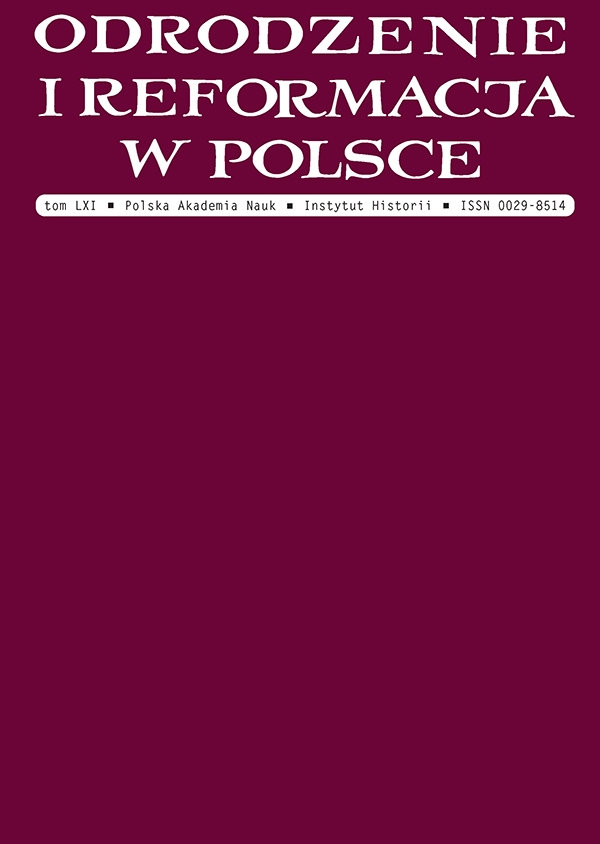Bischöfe, Humanisten und einfache Lutherfeinde. Die Kontakte des Erasmus nach Polen im Spiegel seines Briefwechsels
DOI:
https://doi.org/10.12775/OiRwP.2017.03Palabras clave
Erazm z Rotterdamu, korespondencja, intelektualne, świeckie i duchowne elity Polski, Marcin Luter, reformacja, Erasmus of Rotterdam, correspondence, intellectual, secular, and ecclesiastical elite of Poland, Martin Luther, ReformationResumen
W jaki sposób reformacja w Niemczech krytykowana była przez intelektualne, świeckie i duchowne elity Królestwa Polskiego? Jakie można tu wyróżnić stanowiska, uwzględniając ich zmienność w czasie? Czy w Polsce byli zwolennicy, a może wręcz patroni idei reformacyjnych? W poszukiwaniu odpowiedzi na te pytania sięgnięto po korespondencję Erazma z Rotterdamu, ponieważ utrzymywał on kontakty z wieloma Polakami i osobami w Polsce żyjącymi, a ponadto stanowił dla nich najważniejsze źródło informacji o rozwoju sytuacji w Niemczech.
How has the reformation in Germany been criticized by the intellectual, secular, and ecclesiastical elite of the Polish kingdom? Which different positions are to be made, even in their temporal development? Have there been followers or even patrons of the reformatory ideas in Poland at all? To give answers to these questions, the correspondence of Erasmus of Rotterdam has been chosen, as he not only stayed in contact with numerous Polish or in Poland living people, but he also acts for them as the most important person to give information about the development in Germany.
Citas
C. Backvis, „La fortune d’Érasme en Pologne“, in: Colloquium Erasmianum. Actes du Colloque International réuni à Mons du 26 au 29 octobre 1967 à l’occasion du cinquième centenaire de la naissance d’Érasme (Mons: Mons Centre Universitaire de l’État, 1968), S. 173–202
Erasmus-Rezeption im 16. Jahrhundert, hrsg. v. C. Galle, T. Sarx (Frankfurt a. M. et al.: Verlag Peter Lang, 2012; Kulturgeschichtliche Beiträge zum Mittelalter und zur frühen Neuzeit, 5)
C. Galle, Hodie nullus – cras maximus. Berühmtwerden und Berühmtsein im frühen 16. Jahrhundert am Beispiel des Erasmus von Rotterdam (Münster: Aschendorff Verlag, 2013; Reformationsgeschichtliche Studien und Texte, 158 [Phil. Diss.])
J. Glomski, „Erasmus and Cracow (1510–1530)“, Erasmus Studies 17 (1997), S. 1–18
H. Louthan, „A Model for Christendom? Erasmus, Poland and the Reformation“, Church History 83 (2014), S. 18–37
Polnisch-deutsche Wechselbeziehungen im zweiten Millennium, Tl. 1: Zur polnisch-deutschen Kulturkommunikation in der Geschichte – Materialien, hrsg. v. J. Papiór (Bydgoszcz: Wydawnictwo Akademii Bydgoskiej, 2001)
W. Ribhegge, Erasmus von Rotterdam (Darmstadt: Wissenschaftliche Buchgesellschaft, 2010)
Descargas
Publicado
Cómo citar
Número
Sección
Stats
Number of views and downloads: 499
Number of citations: 0



